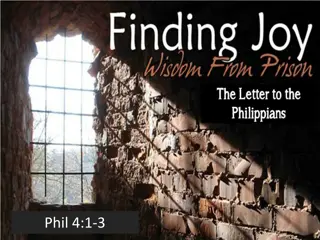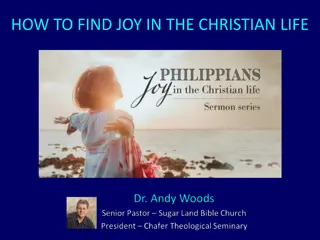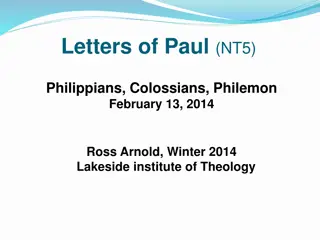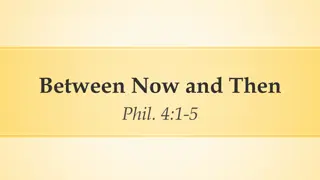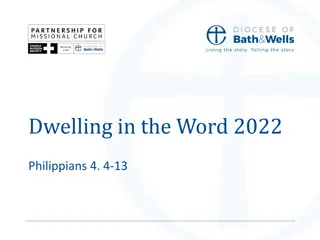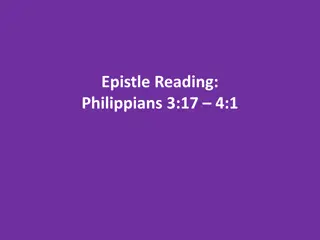Insights into the Letter to the Philippians
Discover the background and context of the Letter to the Philippians. Uncover details about the authorship, the city of Philippi, the establishment of the church, and the purpose of the epistle written by the Apostle Paul. Gain insight into the time and place of writing, as well as the significance of the church at Philippi in supporting Paul during his imprisonment.
Download Presentation

Please find below an Image/Link to download the presentation.
The content on the website is provided AS IS for your information and personal use only. It may not be sold, licensed, or shared on other websites without obtaining consent from the author. Download presentation by click this link. If you encounter any issues during the download, it is possible that the publisher has removed the file from their server.
E N D
Presentation Transcript
Confident Enough to Be Joyful Confident Enough to Be Joyful 1:1 1:1 11 11 Week 31 Week 31 5 October 2022 5 October 2022
INTRODUCTION to
PHILIPPIANS INTRODUCTION AUTHOR: The Apostle Paul joined in his salutation by Timothy. Personal references by the author are certainly consistent with what we know of Paul from other New Testament sources. Paul's authorship of this letter is also supported by the testimony of early church fathers such as Polycarp and Irenaeus. CITY OF PHILIPPI: Named after Philip of Macedonia, the father of Alexander the Great, Philippi was a major city of Macedonia located on the road from Rome to Asia known as the Egnatian Way. It was the site of a famous battle in 42 BC in which Antony and Octavius defeated Brutus and Cassius. In 30 BC, Octavian made the town a Roman colony where retired soldiers could live and enjoy the full privileges of Roman citizenship.
PHILIPPIANS INTRODUCTION CHURCH AT PHILIPPI: During his second missionary journey (49-52 AD), while Paul and his traveling companions (Timothy and Silas) were making their way across Asia Minor (Turkey), Paul received a vision. In the vision, a man of Macedonia pleaded with Paul, Come over to Macedonia and help us. Perceiving that the Lord was calling them to Macedonia, they sailed from Troas (Luke having joined them), and eventually arrived at Philippi (Acts 16:6-12). The conversion of Lydia and the Philippian jailor (Acts 16), contributed to the establishment of the church at Philippi. Additionally, Lydia s conversion, as well as references in the epistle itself (4:2-3), is evident that women played an essential role in the life of the early church.
PHILIPPIANS INTRODUCTION CHURCH AT PHILIPPI: When it became necessary for Paul to leave Philippi, Luke stayed behind to strengthen the Church in Paul s absence (evidences by careful observations of personal pronouns changes within the text; e.g., we to they , cf. Acts 16:12; 17:1). As Paul left Macedonia, the church at Philippi became a significant source of support (4:15-16; 2Cor. 11:9). Paul visited the church at Philippi again on his third missionary journey (Acts 20:2-3, 6).
PHILIPPIANS INTRODUCTION TIME AND PLACE OF WRITING: Philippians, written by Paul around 61-63 ADfrom Rome, is one of four prison epistles (cf. Ephesians, Colossians, and Philemon). The general consensus is that these epistles were written during Paul s imprisonment at Rome. PURPOSE OF THE EPISTLE: The church at Philippi had sent a gift to Paul in Rome by the hand of Epaphroditus (4:10,18). Paul uses this occasion not only to thank them, but to comfort them concerning his situation as a prisoner for Jesus Christ. He also writes of his plans to send Timothy soon, and why he considered it necessary to send Epaphroditus back to them (2:25-30). There may have also been a problem at Philippi involving two women, for Paul has a few words to say concerning them (4:2-3).
PHILIPPIANS INTRODUCTION THEME OF EPISTLE: Throughout this short and rather personal epistle, one keynote resounds again and again. That keynote is JOY. Five times the word joy (Greek: chara) is found (1:4,25; 2:2,29; 4:1), and the verb to rejoice (Greek: chairein) occurs eleven times (twice in 1:18; 2:17,18; 4:4; once in 2:28; 3:1; 4:10). For this reason, the epistle to the Philippians has often been called Paul s Hymn of Joy in which the theme is: Rejoice in the Lord! KEY VERSE: Philippians 4:4 Rejoice in the Lord always. Again I will say, rejoice!
PHILIPPIANS CHAPTER OVERVIEW JOY IN LIVING: Paul wrote his letter to the Philippians to encourage them to find Christ-centered, Spirit-empowered joy in living, serving, sharing, and resting. Though it contains sound doctrine and practical insights that have proven to be relevant throughout the centuries, Philippians is not primarily a theological treatise, but a loving letter of friendship from one brother in Christ to his extended spiritual family. Even when he warns the Philippians about false teaching, he does so warmly and graciously, expecting the best from his readers. In Chapter 1 this theme of joy is exemplified as Paul encourages the Philippians to find Christ-centered, Spirit- empowered joy in living even when things don t seem to be going their way.
PHILIPPIANS CHAPTER OVERVIEW It opens with Paul s cheerful admission that his prayers for the Philippians always kindle the warmth of joy in his heart (1:3-4). He also demonstrates personal joy and optimism in the midst of challenges and difficult circumstances that are beyond his control (1:6-14). This is a message every generation of believers needs to hear! Whether we face conflicts or setbacks, we can find joy in living if Jesus Christ is the source and center of our lives. Regardless of whether we continue on in this world, striving for the gospel, or we pass on to the next to be with Christ, we re to keep our focus on Him, the source of our joy (1:21-25).
PHILIPPIANS 1:1 11 Our is a frivolous age with lots of shallow, empty laughter, but very little real joy. Most people actually stumble around in perpetual confusion and darkness. As they seek genuine joy, they satisfy themselves with occasional glimpses of light and artificiallight at that. It s sad to say, some of the light they are attracted to is a consuming fire. It destroys their lives rather than illuminating their minds or warming their hearts. Paul would have understood this plight as he, too, groped around in darkness until that glorious day when the light of the gospel of Christ shone brightly into his life (Acts 9:1-19). From that day on, although he often experienced suffering, he rarely let the darkening fog of discouragement cloud his mind or drive out the light of joy.
PHILIPPIANS 1:1 11 His letter to the Philippians, embossed with unfading joy on every page, is proof that, for Paul, joy was more than a fleeting emotion; it was part of his ingrained character. How could that be? It s because he was confident that God was at work, that God was in complete control, and that God allowed all things to occur for one ultimate purpose His greater glory. Paul understood that joy doesn t depend on our circumstances, our possessions, or other people. Joy is an attitude of the heart determined by confidence in God. Paul knew that he had no control over the struggles and strife of life.
PHILIPPIANS 1:1 11 But by yielding to the Spirit s work in his soul, Paul s trust and hope in God could guide him like an inner compass, keeping him on joy s course regardless of how strong the gale-force winds blew. In the first chapter of Paul s joy-filled letter to the Philippians, we come face-to-face with his bold, joyous confidence, setting the trajectory for more to come. He extends a warm greeting to the Philippians in 1:1-2, offers up joyful thanksgiving in 1:3-8, and lifts them up in prayer in 1:9-11. All of the lessons in Philippians will be taken from the New King James Version of the Bible [NKJV].
PHILIPPIANS 1:1 2 1Paul and Timothy, bondservants of Jesus Christ, To all the saints in Christ Jesus who are in Philippi, with the bishops and deacons: 2Grace to you and peace from God our Father and the Lord Jesus Christ.
PHILIPPIANS 1:1 2 As he does in all his letters, Paul begins with a customary gracious greeting. When the Philippians took the scroll from the hand of Epaphroditus and unrolled it, the first words they would have seen in the Greek text were Paul and Timothy (1:1). These were not strangers, not remote leaders governing impersonally from a distance through go-betweens these were loving shepherds and beloved friends. Though sometimes the inclusion of multiple names could indicate a sort of co-authorship (First Thessalonians), in the case of Philippians, Timothy probably wasn t involved in the actual composition of the letter itself.
PHILIPPIANS 1:1 2 Throughout the letter Paul uses the first-person singular, indicating that he s personally the source of the words. Why is Timothy included then? Because the Philippians would have had fond memories of that wet- behind-the-ear intern who had just joined Paul and Silas prior to their original arrival in Philippi (Acts 16). Timothy had been there when Paul shared the gospel with Lydia at the place of prayer by the river, when Paul cast the spirit of divination out of a slave girl and caused a great upheaval among the pagans of Philippi, when Paul and Silas were dragged off to prison as a result, and when the fledgling church grew despite their founding apostle and prophet being beaten and jailed.
PHILIPPIANS 1:1 2 No doubt Timothy had been force to step up and begin to lead the best he could in the absence of Paul and Silas. Now, over a decade later, Timothy was still at Paul s side as a kindred spirit of proven worth (Phil. 2:20, 22). Today, icons, statues, and paintings of apostle tend to portray people like Paul and Timothy as larger-than-life heroes. If they aren t bulked up and poised for epic action, their faces glow, halos orbit their heads, and miracles flow from the tips of their fingers. What a contrast to Paul s own humble, self-demoting label bond-servant of Christ Jesus. The term Paul uses, doulos, means one who serves another to the disregard of his own interests.
PHILIPPIANS 1:1 2 Paul then identifies those to whom he writes: both the membership of the church in Philippi (saints in Christ Jesus) and the leadership (overseers and deacons). The Greek word translated overseers (episkopos) refers to a group of leaders keeping a watchful eye over those in their charge. Elsewhere in the NT, Peter calls Jesus the episkopos of our souls (1Pete 2:25). In this sense, the church official designated by this term is someone charged to shepherd the church, to serve as an undershepheard to the Lord, leading His flock on His behalf and under His authority. Paul listed the qualifications of an overseer in a letter to Timothy, who was serving in Ephesus at the time (1Tim. 3:2-7).
PHILIPPIANS 1:1 2 The deacons, in turn, assisted the overseers in various ministry-related tasks. The term diakonos carries the idea of serving obediently, willingly, and submissively from a heart of humility. The Latin translation of the Greek term diakonos is minister, from which we get this particular title. In the NT, diakonos can refer to a servant with a certain mission (Rom. 15:8), a personal assistant (Matt. 22:13), or a person in the office of minister in a local church (Phil. 1:1). The Book of Acts (6:1-6) recounts the appointment of the first deacons in the church. Paul uses the term for minister in the general sense of a self-servant in the kingdom of Christ.
PHILIPPIANS 1:1 2 The church in Philippi, of course, had multiple people appointed to both offices overseers/elders and deacons/ministers (1:1). They were tasked with the equipping of the saints for the work of service, to the building up of the body of Christ (Eph. 4:12). From the youngest to the oldest, from the recently baptized to the first converts, from followers to leaders, Paul calls them all saints and blesses them equally: Grace to you and peace from God our Father and the Lord Jesus Christ (1:2). Though this was a standard greeting in Paul s letters, it s a profoundly deep theological statement. Grace and peace are essential blessings for living the Christian life and especially for carrying out Christian ministry. These things can t be conjured from within; they are gifts from God.
PHILIPPIANS 1:3 8 3I thank my God upon every remembrance of you, 4always in every prayer of mine making request for you all with joy, 5for your fellowship in the gospel from the first day until now, 6being confident of this very thing, that He who has begun a good work in you will complete it until the day of Jesus Christ; 7just as it is right for me to think this of you all, because I have you in my heart, inasmuch as both in my chains and in the defense and confirmation of the gospel, you all are partakers with me of grace. 8For God is my witness, how greatly I long for you all with the affection of Jesus Christ.
PHILIPPIANS 1:3 8 Paul s fond memories of the Philippians prompted him to follow his gracious greeting with joyous thankfulness and prayer (3-4). Regarding the Philippians , he had no regrets, no ill feelings, no unresolved conflicts. His heart was filled with joy as he reminisced on the times he had spent with them their first meeting over a decade earlier when the church was planted (Acts 16) and another gathering during his third missionary journey (Acts 20). But his thankfulness and joy were not inspired by mere nostalgia. Paul indicates in 1:5 that the Philippians were participating in the gospel from the first day until now. Their commitment to Christ and the proclamation of His word never let up, not for a moment.
PHILIPPIANS 1:3 8 Because of the Philippians past perseverance and present passion, Paul was confident in their future faithfulness (1:6). He had no doubt that God was at work in Philippi, that he had plans for that church, and that He was in control and would see them through to the end. God had begun the work of spiritual growth, of ministry participation, and of faithful Christian witness among these believers. And He would stay at it until He called them home or until Christ stepped back into this world to reward them for their Spirit-enabled labor. Paul exposes his deep feelings in 1:7-8. Far from being a cold, get-it-done apostle, Paul didn t hesitate to share his deep emotions. He always had the Philippians in his heart (1:7).
PHILIPPIANS 1:3 8 Their commitment to him through thick and thin and their participation in the gospel ministry only served to strengthen his own heartfelt commitment to them. They were more than friends. They were lifelong partners in Christ. Because of this, Paul yearned for them (1:8). Notice how many times Paul repeated the word all in 1:1-8: He greeted all the saints (1:1). He thanked God in all his remembrance. (1:3). He prayed for all of them (1:4). He felt strongly about them all (1:7). They were all fellow partaker of grace (1:7). He affectionately longed for them all (1:8).
PHILIPPIANS 1:9 11 9And this I pray, that your love may abound still more and more in knowledge and all discernment, 10that you may approve the things that are excellent, that you may be sincere and without offense till the day of Christ, 11being filled with the fruits of righteousness which are by Jesus Christ, to the glory and praise of God.
PHILIPPIANS 1:9 11 This profound thankfulness and love led to specific prayers for the Philippians, as it should for us. Christians shouldn t just say, You re in our thoughts. We should say, You re in our prayers and we should mean it! Paul certainly did. His deep, joyful contemplation of the Philippians prompted him to pray for some specific things, things that can only come from God. FIRST he prayed that their love would continue to grow and would be characterized by real knowledge and all discernment (1:9). Love is like a river, it needs to be guided by the banks of knowledge and discernment. Paul isn t telling the Philippians to let their love blind them to truth and righteousness so they end up overlooking sin and compromising holiness.
PHILIPPIANS 1:9 11 We often see a false interpretation of love in the world today. True Christian love, however, is guided by the best interest of others. With true knowledge and discernment, love learns to spot the phony, the wrong, the evil. It learns to approve the things that are excellent (1:10). This love, guided by wisdom, will preserve believers in righteousness until the day of Christ the Second Coming, when the Lord Jesus will reward them for faithfulness. SECOND Paul prayed that they would be filled with the fruit of righteousness (1:11). Don t confuse this with self- righteousness, personal piety, or self-motivated works. Paul is referring to the righteousness of Christ working in us by the indwelling Holy Spirit to produce fruit in our lives (cf., Gal. 5:22-23).
PHILIPPIANS 1:9 11 The result of such good works empowered by God will be the glory and praise of God (1:11) not our own praise and glory. Jesus said essentially the same thing: Let your light shine before men in such a way that they may see your good works, and glorify your Father who is in heaven (Matthew 5:16). What a solid basis for abiding joy! When Paul scanned the ten-year life span of the body of Christ in Philippi, he had every reason to rejoice in confidence, as expressed in thanksgiving, prayer, and praise.
NEXT CLASS 5 October 2022 Before next class, read the below verses in the Before next class, read the below verses in the NKJV and in one other versions of the Bible, NKJV and in one other versions of the Bible, i.e., NIV, NRSV, KJV, CEV, etc i.e., NIV, NRSV, KJV, CEV, etc Chapter 1:12 20 What a Way to Live









